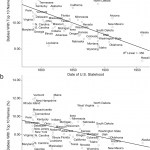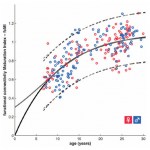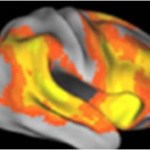Developmental Psychology
What is learning?
Most psychologists (indeed, most people in general) would agree that learning is the acquisition of new knowledge, or new behaviors, or new skills. Hungarian psychologists Gergely and Csibra offer a deceptively simple description: "Learning involves acquiring new information and using it later when necessary." What this means is that learning requires the generalization of information to new situations - new people, objects, locations, or events. The problem is that any particular piece of information that a human or animal receives is situated within a particular context…
There's a very well-known experiment in developmental psychology called the "A-not-B task." The experiment goes something like this: you, the experimenter, are seated opposite a human infant. Within the reach of both you and the child are two boxes: box "A," and box "B." You hide a toy in "A," in full view of the infant. As expected, the infant reaches for "A" to retrieve the toy. You repeat the process several times. Each time you hide the toy in "A," and each time the infant reaches for "A" to find the toy. Experimental set-ups like this are extremely common in infant and animal studies.…
PsychBytes is an experiment: three recent findings in psychology, each explained in three paragraphs or less. Generally, these are papers that I wouldn't have otherwise covered in this blog. Please share your thoughts on this model in the comments. What works, and what doesn't? Would you like more PsychBytes in the future?
What's In A Name?
People who settle down and build a life in the frontier tend to be more individualistic, even if they started out with more interdependent values. Some features of the frontier life that would be attractive to an independent person are low population…
Despite the fact that my research lies at the intersection between cognitive, comparative, and developmental psychology, I am also quite interested in the evolution of our understanding of psychopathology. The ultimate goal of the study of psychopathology is to ground such disorders in brain and body. But our understanding of some pathologies are simply not there yet (though some of our therapeutic interventions still prove effective even if we don't quite understand the etiology of a given disease or disorder). The main conflict in the field that characterizes the study of psychopathology is…
In 1975, Edward Tronick and colleagues first presented the "still face experiment" to colleagues at the biennial meeting of the Society for Research in Child Development. He described a phenomenon in which an infant, after three minutes of "interaction" with a non-responsive expressionless mother, "rapidly sobers and grows wary. He makes repeated attempts to get the interaction into its usual reciprocal pattern. When these attempts fail, the infant withdraws [and] orients his face and body away from his mother with a withdrawn, hopeless facial expression." It remains one of the most…
Your humble narrator finds himself sick with a cold, so here's a post from the archives.
There is considerable research on how children interact with other children and with adults, and how child development can be influenced by those interactions. But research on children's interactions with non-human animals seem to be limited. Given how ubiquitous pets are in the homes of children (at least, in WEIRD cultures), it is somewhat surprising that there hasn't been more work on the way pet ownership might affect child development.
According to the US Humane Society:
There are approximately 77…
Morality and convention are so mired in culture that it may seem near impossible to determine the extent to which biology and environment give rise to it. And yet it is possible to investigate the evolutionary origins of morality. Research with infants - especially pre-verbal infants - who have not yet been sufficiently exposed to most cultural institutions, can provide an opportunity to determine what the evolutionary and developmental building blocks are for complex moral reasoning.
Human adults evaluate individuals very quickly, on the basis of both physical and behavioral traits and…
In last week's Science, Dosenbach et al describe a set of sophisticated machine learning techniques they've used to predict age from the way that hemodynamics correlate both within and across various functional networks in the brain. As described over at the BungeLab Blog, and at Neuroskeptic, the classification is amazingly accurate, generalizes easily to two independent data sets with different acquisition parameters, and has some real potential for future use in the diagnosis of developmental disorders - made all the easier since the underlying resting-state functional connectivity data…
If I had to describe the mission, the point, the raison d'etre of the entire field of psychology in just one sentence, I would say: Psychology aims to determine the relative extents to which biology and experience determine cognition and behavior." And, as you might expect, there are widely differing schools of thought. Nativists emphasize genetics, biology, and innate mechanisms. By contrast, the empiricists insist that babies are born into the world with no a priori knowledge thereof, and just a powerful statistical associative learning mechanism by which they piece together their…
This post considering the evolutionary origins of numerical cognition, specifically in terms of the approximation of large numbers, is meant as a companion to this week's series on the developmental origins of numerical cognition and developmental dyscalculia, at Child's Play.
What are the origins of number representation in the mind? Are there any innate building blocks that contribute to our understanding of mathematics and number, or must everything be learned?
Number is an important domain of human knowledge. Many decisions in life are based on quantitative evidence, sometimes with life…
There are a few fascinating papers to come out recently that I won't have time to cover in detail, but which people may find interesting. References and abstracts after the jump:
Watson & Strayer (2010). Supertaskers: Profiles in extraordinary multitasking ability. Psychon Bull Rev.
Abstract: Theory suggests that driving should be impaired for any motorist who is concurrently talking on a cell phone. But is everybody impaired by this dual-task combination? We tested 200 participants in a high-fidelity driving simulator in both single- and dual-task conditions. The dual task involved…
If there is one book that every human should read, it is The Invisible Gorilla, by Chris Chabris and Dan Simons.
I suppose that's a pretty bold statement to make. Let me explain. As a student of psychology, and as someone who studies and writes about the mind, I am overwhelmed with the general perception among the lay public that "social science findings often reaffirm or echo what common sense observations tell us." But the truth is that common sense observations often lead us astray. We have very little insight into the way our minds actually operate. And the thing is, this is likely a…
Two seemingly contradictory trends characterize brain development during childhood and adolescence:
Diffuse to focal: a shift from relatively diffuse recruitment of neural regions to more focal and specific patterns of activity, whether in terms of the number of regions recruited, or the magnitude or spatial extent of that recruitment
Local to distributed: a shift in the way this activity correlates across the brain, from being more locally arranged to showing more long-distance correlations.
In this post I will describe some of the most definitive evidence for each of these developmental…
How can we enhance perception, learning, memory, and cognitive control? Any answer to this question will require a better understanding of the way they are best enhanced: through cognitive change in early development.
But we can't stop there. We also want to know more about the neural substrates that enable and reflect these cognitive transformations across development. Some information is provided by developmental neuroimaging, but even that's not enough, because the real question we have can only be answered via mechanisms ("how"/"why") - quite different than the "what" "where" and "…
A nice 2010 Human Brain Mapping paper by Church, Petersen & Schlaggar covers a number of interpretational issues confronting modern neuroimaging. Their particular application is pediatric neuroimaging (I will also use developmental examples), but the general issues apply to nearly all fMRI studies. So here are some important things to keep in mind whenever you read an fMRI study:
1. "The Performance Burden" If neural activity is found to differ between groups or conditions, you can't necessarily make inferences about differences in neural information processing - this could reflect…
A 2010 FINS paper from Cohen et al. demonstrates that multivariate patterns in neural recruitment during response inhibition across the brain are significantly predictive of response inhibition ability and age of the scanned subject, and shows that other factors (such as response variability and reaction times) cannot be similarly predicted from the same data.
Cohen et al asked twenty-seven 9-19 year-olds and nine 25-30 year-olds to complete a standard "stop signal" task. On 75% of trials ("Go trials") this task is identical to a 2-choice reaction time task (i.e., as quickly as possible…
Happy Father's Day, everyone!
I spent a lot of time today thinking back to why I started blogging in the first place, while I was at my parents house doing the other-than-science things that I love to do: playing with the dog, cooking, gardening. I realized that I've not done enough of that stuff lately.
I've only been seriously doing the blog thing (in the current format) since January, and I've now been here at Scienceblogs around two months, so it was time to reflect. The transition from Wordpress obscurity to Scienceblogs prominence happened relatively quickly for me, and I think it's a…
Evolutionary Psychology suffers from a PR problem, which can be mostly blamed on ignorant (even if well-intentioned) members of the population who don't know what they're talking about.
Evolutionary psychology attempts to describe the evolution of the mind and of behavior and, well, everyone has a mind, and everyone can observe behavior. This makes people think that they are experts. Anybody who has ever had a child knows everything there is to know about child development. Anybody who has ever owned a dog becomes an expert on canine behavior. Study after study demonstrates the fact that…
...and what can word-learning in dogs teach us about the evolution of language in humans?
What is involved in the learning of a single new word? Consider the word "tiger", being learned by a child with already a modest vocabulary, at least for animal words. First the child must make a new entry in the mental lexicon - that "tiger" is a word in the first place. He has to categorize it as a noun. It has to be categorized under "animal" (a supernym) and related to its hyponyms, like "Sumatran tiger." Then, of course, the child has to learn what actual *thing* the word "tiger" refers to. Now,…
This seems to have become unofficial volcano week, here at ScienceBlogs. If you haven't been following the coverage of the Eyjafjallajökull eruption at Erik Klemetti's Eruptions blog, you should consider doing so. Also, Dr. Isis has a post on how the eruption has fouled up all nuclear imaging plans at her place of research, and Ethan explains how volcanic lightening works.
Our benevolent overlords have further commented: "Eyjafjallajökull's ill temper has been an unexpected object lesson in the complexity and interconnectedness of our environment, technology, and social networks." To that I…













